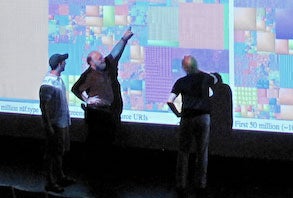
The Rensselaer Institute for Data Exploration and Applications
We increasingly live in a data-driven, web-enabled, supercomputer-powered, globally interconnected world, and this poses significant new challenges to scientists and engineers throughout all of their disciplines. Attacking these problems will require significant new technologies for sensing the environment, collecting and analyzing this data, using it to simulate engineered, biological and social systems, and applying these results to provide effectors, physical or cyber, that can help solve critical global challenges. The Rensselaer IDEA will enable research across this campus to access such technologies via the development of critical computational methodologies including data-intensive supercomputing, large-scale agent-based simulation, and cognitive computing technologies.
Sub-thrusts:
- Data-Driven Medical and Healthcare Applications: We are exploring areas including personalized and mobile medical care, improved healthcare analytics, and new data-based approaches to driving down the cost of medical care.
- Business Analytics: Critical infrastructure challenges arise in areas such as supply-chain network analysis and predictive analytics for modeling markets and other dynamic systems.
- Built and Natural Environments/Smart Cities: Increasing capabilities for monitoring both natural and built ecologies can lead to significant environmental advances for society. Projects scale in range from studying the molecular “biomes” that arise in urban environments to modeling large-scale environments and ecological climate effects.
- Agents in Virtual and Augmented Reality: New computational technologies are needed not just for modeling built and natural systems, but also the social systems that result from how we live and work in both the cyber and physical worlds. Additionally the visualization and analysis of very large datasets requires new approaches to multi-user, multimodal data interaction technologies. New and scalable agent-based technologies using both cognitive and supercomputing techniques are also a focus of this research.
- Data-Centric Engineering: Engineering design is based on the modeling of processes, devices, and systems. Increasingly, large-scale data analysis and predictive data technologies are being used to inform the engineering models. Bridging the gap between analytics and modeling is thus a crucial capability to the future of rapidly developing and improving engineered systems.
- Cybersecurity and Network Analysis: Increasingly threats to society are growing where the networked systems of modern cyberspace come into contact with physical control systems and the social systems of people.
- Data-Driven Basic Science: The use of data-driven techniques for helping scientists with their basic research has grown to the point where some now refer to this as the “Fourth Paradigm” of science. The growing area of “Semantic eScience” is another key area of research.
- Policy, Ethics, and Open Data: The big-data and supercomputing revolution has the power to change the world for the better. However, it also comes with a darkside. This sub-thrust focuses on how we achieve the benefits while controlling for the threats posed by ill-informed policy creation, unethical collection and use of data, and the tension between open data and privacy protections.
